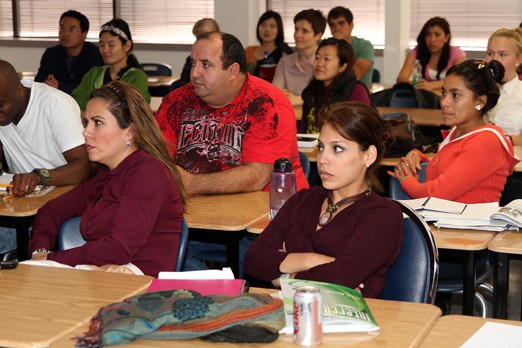International students are starting to make up a higher percentage of the student body at Confederation College.
But while the world is getting smaller and smaller, thanks to technology, the comforts of home are never quite the same when studying abroad. The food is different, the culture is unique, and even the pace of life can be much faster or slower, depending on where the student is arriving from.
Victoria Shishkova, a St. Petersburg, Russia native who arrived in Thunder Bay via Finland’s HAMK University of Applied Sciences, said she’s experienced culture shock since coming to Canada.
Finland, where she studied, is a lot like Northern Ontario, at least topographically speaking, but Thunder Bay is nowhere near as calm as her temporary home.
“In Finland they don’t have that many people in the street,” Shishkova said, noting one of the first things she was taught in Canada was to stay safe.
It’s not nearly as big a worry in Finland or Russia, she said.
“We got a presentation on security. In Finland they never talk about security because you know you are secure there,” she said.
“I’ve been here three weeks and I guess it’s pretty secure. If it’s dark you go on streets where there is traffic so you can be sure no one is going to (jump you).”
Shishkova, who is in Canada on an exchange program with her university, said she was careful to scout out potential schools before making a decision.
Thunder Bay was an easy choice, she said, added that she wanted to go somewhere to practice her English.
“I didn’t choose England, because it’s like Europe. I wanted to go to a different continent. And we have kind of a stereotype about Canadians. They are more welcoming than Americans,” she said.
Shishkova isn’t alone in her thoughts.
“They have a lot of people who come from other countries who are living here,” said fellow student Davi Braga, joining a growing contingent of Brazilians in Thunder Bay.
“They say it is really easy to get used to Canada because every part really welcomes people.”
The college is doing a great job helping students make the transition, organizing homes for international students who don’t want to live in residence.
“From the first day you integrate with a Canadian family,” she said.
Miriam Wall, the college’s director of international education, said the school goes out of its way to help students adapt, calling it a pretty intense process.
Not every student needs the help, but there are plenty of ways news students can get used to new surroundings, half a world away from their comfort zone.
On Monday she shared several clues, encouraging students to immerse themselves in the local language and culture, be adventurous and flexible, not to get down on themselves and to focus on the present, and not the past and future.
“My mantra is to always say yes,” she told a classroom full of international students. “It’s a good way to get involved.”
Realizing everything won’t be like it is back home is the best way to acclimatize, she said.
“The Chinese food here is much different than it is in China,” one student said during the workshop.
Wall had a simple solution.
“Make it yourself,” she said, quickly joking to let her know what time dinner would be served.
Confederation College Jim Madder said the school has made a concerted effort recruiting potential students from overseas, calling it a big part of the school’s future.
The school already has agents in India and China, and his reasoning works on a couple of levels. For Confederation College, it means more students and fuller classroom. For the students coming overseas, it’s a chance to study at a world-class facility.
But it also has its benefits for local students.
“They bring their own cultures, they bring their own holiday, dance to food to opinions, which are often quite different from what we’ve grown up with here. Any type of subjects, especially politics, they’re going to pipe up and learn, but also help us learn what the reality was for them,” Madder said.
